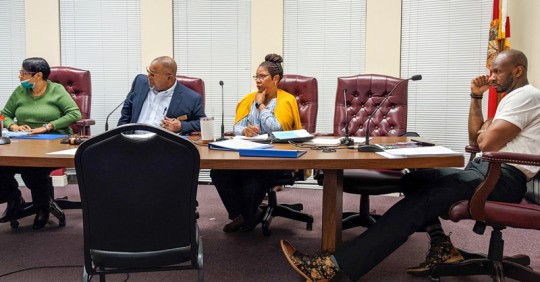Century Joins Area Governments In Calling For State Review Of FPL’s Rates
April 20, 2022
The Century Town Council on Tuesday night agreed to have Mayor Ben Boutwell write a letter to the Florida Public Service Commission asking them to reconsider Florida Power & Light’s rate structure.
Escambia County, Pensacola, Milton, Gulf Breeze and Crestview have already sent similar letters to the state.
Pictured: The Century Town Council Tuesday night: (L-R) Sandra McMurray Jackson, Luis Gomez, Jr., Dynette Lewis and James Smith. Council member Leonard White participated by Zoom. NorthEscambia.com photo, click to enlarge.
Comments
2 Responses to “Century Joins Area Governments In Calling For State Review Of FPL’s Rates”




@ C J
great info and thanks for it !
The most recent budget posted to the town’s website is two years old (Fiscal Year 2019-2020). For that year it was projected that town families and businesses would pay $105,000 in “Franchise Fees – Gulf Power.” The amount in the current budget (Fiscal Year 2021-2022) is presumably several thousand dollars more. Gulf Power (now FPL) collects the money from ratepayers and gives it to the town. Generally, franchise fees are paid to local governments each quarter and I assume the utility put the money in the bank and makes some interest between payments.
Perhaps the Town Council could vote to end collection of the electric power franchise fee and let Century families and businesses keep a bit more of their money. State law gives counties and municipalities the authority to charge franchise fees. Just as town council has the option to charge franchise fees it has the option to not charge them. By the way, I know that a municipal charter cannot prohibit a municipality from charging a tax that the municipality is authorized to charge by state law. I can think of a few possible workarounds such as requiring that all ordinances and resolutions authorizing taxes be adopted by a unanimous vote. I’m not aware if a municipal charter can prohibit the municipality from charging franchise fees. That might be an interesting question for the charter review committee to ask the town attorney. If such a provision is legal, and if the town council will not put it in the charter, any town voter can propose a charter amendment to make it part of the charter. The procedure to propose a charter amendment is described in Section 166.031 Charter Amendments, Florida Statutes.